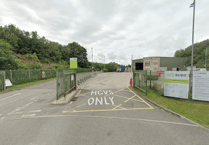A LOCAL MP has given his backing to the biogas industry during a speech at the Eden Project near St Austell.
The St Austell and Newquay MP Noah Law addressed industry guests about the need for the government to ensure biogas meets its potential in delivering Britain’s clean energy needs.
Mr Law made the speech a few days after he had visited the anaerobic digestion plant at Fraddon.
The anaerobic digestion process consisting of storing organic material, such as food waste, agricultural waste, manure and sewage, in an airtight container called a digester.
The material is deprived of oxygen and breaks down, producing biogas which can power and heat homes and, upgraded to biomethane, can be used as a sustainable transport fuel.
The other product from the process, known as the digestate, can be used to as a fertiliser on farms.
The plant at Fraddon, which was commissioned in 2014, converts organic waste from local farmers, bakeries and food and drink producers, and provides renewable gas and electricity for around 2,500 homes in Cornwall.
In his speech, Mr Law said: “I recently visited Fraddon Biogas, where organic waste from local farms and food producers is being turned into renewable energy and biofertiliser. This is a prime example of how biogas not only helps tackle climate change but also benefits the local economy and supports sustainable farming.
“However, we need the government to act swiftly in removing the barriers holding back this industry. I have requested a meeting with the Energy Minister to discuss how we can reform the UK Emissions Trading Scheme to recognise the environmental benefits of biomethane and address the regulatory hurdles that are stifling the growth of this vital sector."
“Cornwall is also leading the way with its Net Zero Methane Hub, a project designed to drive innovation and investment in methane capture and use. By bringing together producers, researchers and policymakers, the hub is scaling up the adoption of methane capture technology - particularly in the dairy sector, where reducing methane emissions is critical.
“We must support local farmers in turning a major environmental challenge into an economic opportunity, cutting emissions while providing an additional revenue stream.”
Johan Lourens, commercial manager of Material Change which runs the Fraddon plant, had been delighted to welcome Mr Law who showed a keen interest in the waste-to-energy operation.
Mr Lourens said: “For Cornwall to process organic waste locally, industry support is crucial.
“With Mr Law’s support, we hope that Cornwall’s waste-to-energy sector will continue to grow, enabling us to divert more waste from landfill and expand our contribution to the UK’s decarbonisation and energy security targets.
“Unlocking the full potential of biogas could transform not just Cornwall, because of our agricultural output and need for decentralised energy, but the whole country.
“If we tackle the barriers to growth, we can accelerate our path to net zero while creating green jobs and boosting energy security. The future of renewable energy is not just about wind turbines and solar panels - it’s also about harnessing the power of organic waste.”




